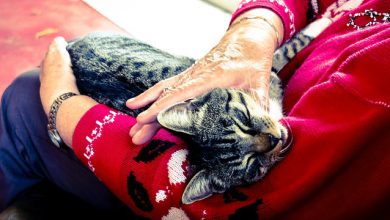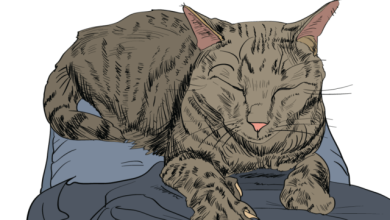
This article is part of our Mental Health Awareness Month. Brought to you by Touched by aHorse.
You head to the barn after a long day at work, snatch the halter off the hook, and stomp out to the pasture to catch your horse. He sees you coming and lifts his head, maybe trotting away from you or displaying wary behavior. Your bad mood is apparent, and he can see it from a mile away. Our emotional state is often obvious to our horse, you carry those emotions everywhere with you, including to the barn. You try to avoid those emotions while riding. But you notice that your horse has begun to pick up on how you feel. Horses have a unique ability to understand our emotions, and will often react in kind.

Be aware of the mood you are in when you head to the barn – your horse will be able to pick up on your emotional state.
Lightpoet/adobe.stock.com
Stress and Anxiety Are Contagious
Have you ever climbed into the saddle and grabbed ahold of the reins with tense and nervous hands? You might notice that your horse lifts his head, and exhibits signs of nervousness as well. Your nonverbal cues are often received loud and clear by your horse, and he can feel when you’re tense and wired tight.
As prey animals, horses are highly attuned to changes in their environment. This means that he can tune in to your emotional state and notice how you’re feeling. When you arrive at the barn in a state of anger, frustration, or high stress, your horse will feel that. Now, your horse also has a remarkable ability to bring you back to a better headspace. But, be aware of the mood you are in when you head to the barn, and know when to take time to just groom and be with your horse versus enter into a rigorous training session when you’re not in a good mindset.
[Read “How Your Horse Reflects Your Emotions Back to You”]
Social Intelligence
One of the key factors behind a horse’s ability to understand human emotions lies in their exceptional social intelligence. Horses are herd animals with complex social structures, and as such, they possess a natural inclination to empathize and bond with others, including humans. This innate social awareness allows them to not only recognize human emotional states but also to mirror and respond to those emotions in a way that fosters connection and trust. Whether through gentle nuzzling, attentive listening, or simply standing quietly by, horses have a unique capacity to provide comfort and solace in response to our feelings.
If you’ve ever hugged your horse during a tough time and felt him rest his head on your shoulder, or lean his body weight into yours, you have felt the healing power of the horse. The nonverbal nature of equine communication also aligns with the way humans express emotions nonverbally. This can create a natural bridge for understanding between the two species. By observing and mirroring subtle cues such as body posture, breathing patterns, and energy levels, horses can effectively “read” the emotional states of their human counterparts. This ability to attune to human emotions not only enriches the human-horse bond but also underscores the profound depth of emotional intelligence that horses possess.

Tune In
This requires us as riders to be aware and cognizant of our own emotional state when we climb into the saddle. If your horse picks up on your body language and mood, then be aware of your headspace before you climb into the saddle. This isn’t to say that it’s not okay to have a bad day at the barn, that’s just part of life. But, if you know your frustration might impact your horse’s performance and well-being, maybe take a day to just spend time grooming him or doing groundwork. Diving into a difficult training session when in a heightened state could be a recipe for frustration for you both.
The remarkable ability of horses to understand and respond to human emotions serves as a testament to the depth of their empathy and social intelligence. This means that we owe it to them to be aware of our own emotions, and the impact they can have on our horse.



